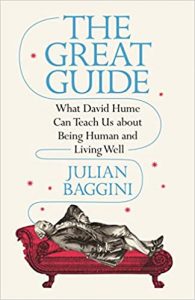I’ve thoroughly enjoyed Julian Baggini’s The Great Guide: What David Hume Can Teach Us about Being Human and Living Well. It took me back in a Proustian way to the late 1970s, when I was reading Hume in my PPE course and struggling with the ideas-impressions discussion while relishing his essay on the price-specie flow mechanism. But then I was always much better at the E than either of the Ps. And despite my struggles with philosophy, I’ve always been a Hume fan. The pragmatism, empiricism, moderation all appealed. Of course, Hume like so many of our forebears held views we see as unacceptable – the book discusses them in an early chapter. But I hold to my generally high opinion of him, feeling we could share a motto: Well, it’s a bit more complicated than that.
The Great Guide takes a chronological approach through Hume’s life, using the pleasing device of visiting the places he lived and including photos by the author. The key ideas are pegged to different chapters as Hume published his books and essays. There’s an excellent discussion of induction, and the role of experience as opposed to a priori reasoning in understanding causality. As Baggini summarises, it logic is algorithmic but, “There is no algorithm for good reaosning.” There is also an interesting section on the social character of reasoning: reasoning needs not to be something that inheres in us as individuals. “Although there is a sense in which we have to be the ultimate judge of what seems most rational to us, in order to reach such a judgement we have to argue with others and hear conrtdictory viewpoints.”
I also liked the discussion of Hume’s idea of personal identity as an aggregate of feelings, perceptions, ideas etc, which Baggini tells me is close to the Buddhist concept of anatta. And thoroughly agree with him that, “Hume shows us that the best writing combines rigor of thought with clarity of expression, difficulty of substance with ease of style.”
Maxims like these are dotted through the book and collected at the end, to live up to the promise of the subtitle. They reinforce Hume’s position as my favourite philosopher.

